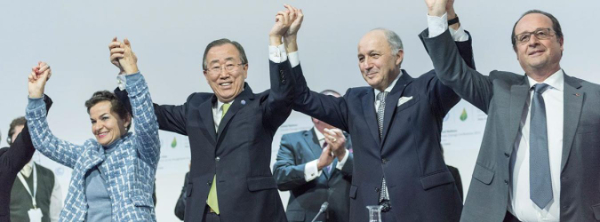The Paris Agreement

Climate change is a global emergency that goes beyond national borders. It is an issue that requires coordinated solutions at all levels and international cooperation to help countries move toward a low-carbon economy.
To tackle climate change and its negative impacts, 197 countries adopted the Paris Agreement at the COP21 in Paris on 12 December 2015. Entered into force less than a year later, the deal aims to substantially reduce global greenhouse gas emissions and to limit the global temperature increase in this century to 2 degrees Celsius while pursuing means to limit the increase even further to 1.5 degrees.
Today, 189 countries have joined the Paris Agreement.
The agreement includes commitments from all countries to reduce their emissions and work together to adapt to the impacts of climate change and calls on countries to strengthen their commitments over time. The Agreement provides a pathway for developed nations to assist developing nations in their climate mitigation and adaptation efforts while creating a framework for the transparent monitoring and reporting of countries’ climate goals.
The Paris Agreement provides a durable framework guiding the global effort for decades to come. The aim is to raise countries’ climate ambition over time. To promote this, the agreement establishes two review processes, each on a five-year cycle.
The Paris Agreement marks the beginning of a shift towards a low-carbon world-- there is much more to do. Implementation of the Agreement is essential for the achievement of the Sustainable Development Goals as it provides a roadmap for climate actions that will reduce emissions and build climate resilience.
Key elements of the Paris Agreement
- To keep global temperatures well below 2C (3.6F) above pre-industrial times while pursuing means to limit the increase to 1.5C.
- To review countries’ contribution to cutting emissions every five years
- To help poorer nations by providing climate finance to adapt to climate change and switch to renewable energy
Ratification
The Paris Agreement formally entered into force on 4 November 2016. Other countries have continued to become parties to the Agreement as they complete their national approval procedures. To this date, 195 Parties have signed and 189 have ratified the Agreement. Further information related to the Paris Agreement and the ratification status can be found here.
In 2018, delegates to COP 24, which was hosted in Katowice, Poland, adopted a comprehensive rulebook, fleshing out the operational details of the Paris Agreement.


 ITUC: The Greatest Threat To Democracy In 80 Years - Stop The Billionaire Coup
ITUC: The Greatest Threat To Democracy In 80 Years - Stop The Billionaire Coup Save The Children: A Third Of 5-Year-Olds Will Be Spared Unprecedented Lifetime Exposure To Dangerous Heat If World Meets 1.5°C Temperature
Save The Children: A Third Of 5-Year-Olds Will Be Spared Unprecedented Lifetime Exposure To Dangerous Heat If World Meets 1.5°C Temperature Access Now: NSO To Pay $168 Million In Damages To WhatsApp For Pegasus Spyware Hacking
Access Now: NSO To Pay $168 Million In Damages To WhatsApp For Pegasus Spyware Hacking NIWA: New Study Reveals Climate Change Is Already Impacting The Andes
NIWA: New Study Reveals Climate Change Is Already Impacting The Andes Friends of Tonga: Bilingual Reading Apps Aim To Boost Literacy In Tonga
Friends of Tonga: Bilingual Reading Apps Aim To Boost Literacy In Tonga UN News: Guterres Alarmed By Israeli Plans To Expand Gaza Ground Offensive
UN News: Guterres Alarmed By Israeli Plans To Expand Gaza Ground Offensive